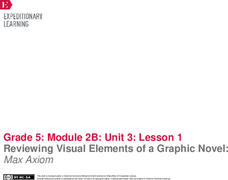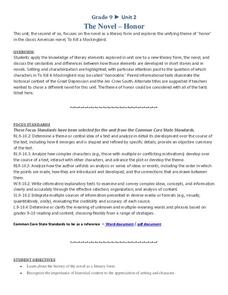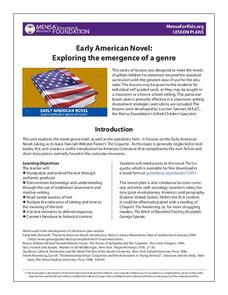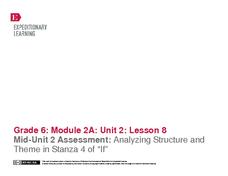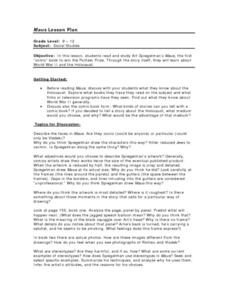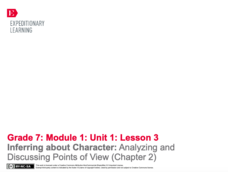Curated OER
Analyzing Folklore: Redwall
Brian Jacques’ novel Redwall provides the focus for a series of lessons involving the analysis of folklore. Adopting the persona of a character, groups write letters in the voice of their character, assemble a collage using Microsoft...
EngageNY
Reviewing Visual Elements of a Graphic Novel: Max Axiom
Pass the tea! Using the resource, scholars participate in a Tea Party protocol to analyze text and images about inventions that helped meet societal demands. After sharing their observations with each other, they discuss visual elements...
EngageNY
World Café to Analyze the Characters in Lyddie
Order up! Welcome to the World Café, where scholars engage in small-group discussions based on Katherine Paterson's novel Lyddie. As pupils circulate around the room, they talk with classmates about the novel's characters, setting,...
West Jefferson High School
The Novel — Honor
For classes tackling To Kill a Mockingbird, this lesson plan sets readers up for discussions or essay writing with questions and prompts. The prompts encourage individuals to explore beyond the novel itself, looking at...
MENSA Education & Research Foundation
Early American Novel: Exploring the Emergence of a Genre
Need an extra challenge for your best readers? Check out a unit that uses Hannah Webster Foster’s epistolary novel, The Coquette, published in 1797, as the anchor text. The resource is packed with project ideas; each with its...
Wuthering Heights
Wuthering Heights
Finally, a reason to use those digital devices in class! Many readers appreciate the convenience of accessing reading material on digital devices. A convenient eBook contains the entire text of Emily Bronte's Wuthering Heights in digital...
EngageNY
Analyzing Character: Who is Lyddie?
Character analysis can help readers feel more connected to a literary text. Scholars explore the topic by writing an acrostic poem about the main character from Katherine Paterson's novel, Lyddie. Then, pupils watch a short video to help...
EngageNY
Analyzing Textual Evidence: Working Conditions in the Mills
Deafening, dusty, debris. Such were the working conditions in the 1800s textile industry as portrayed in Katherine Paterson's novel Lyddie. Scholars watch a short video clip about life and work in the mills. Next, they work...
EngageNY
Analyzing the Significance of the Novel’s Title: Connecting the Universal Refugee Experience to Inside Out and Back Again, Part 2
How does poetry help people better understand societal issues? Pupils participate in a jigsaw activity to analyze poems from the novel Inside Out & Back Again. Next, they connect the poems to real-life refugee experiences from the...
EngageNY
Analyzing the Significance of the Novel’s Title: Connecting the Universal Refugee Experience to Inside Out and Back Again, Part 3
What does it mean to mourn something? Scholars continue reading paragraph four from "Refugee and Immigrant Children: A Comparison" to better understand the mourning process for refugee children. Working with a partner, pupils then read...
EngageNY
Analyzing Structure and Theme in Stanza 4 of “If”
Here is a lesson that provides scholars with two opportunities to stretch their compare-and-contrast muscles. First, learners compare and contrast their experience reading the fourth stanza of If by Rudyard Kipling to listening to the...
EngageNY
Analyzing Poems from Inside Out and Back Again to Develop Criteria for an Effective Poem
Scholars analyze a model poem to help guide their poetry writing. They use Think-Pair-Share to discuss word choice and meaning in "Papaya Tree" and "Wet and Crying." To finish, they use their discussions to collect evidence on what makes...
Curated OER
Maus Lesson Plan
The artistic choices Art Spiegelman made in his graphic novel, Maus, are the focus of an exercise that asks class members to compare classic comic book forms with Spiegelman’s panels and frames. Directed to specific pages and guided by a...
National Endowment for the Humanities
Faulkner's As I Lay Dying: Concluding the Novel
As I Lay Dying is a beautiful book and a wonderful vehicle for understanding, interpreting, and comparing themes. The class reads and analyzes the novel, discusses possible interpretations, and characterizations. They compare the themes...
EngageNY
Mid-Unit Assessment and Discussing Themes in Esperanza Rising: (Chapter 9: "Las Ciruelas/PLums")
Give this skills-based assessment halfway through your unit on Esperanza Rising. After a brief review, class members take the test, which asks them to show that they know how to analyze the novel independently. They are asked to...
EngageNY
End of Unit 1 Assessment: Analyzing an Excerpt from Barack Obama’s Back-to-School Speech
In order to assess their mastery of the concepts taught in a 12-lesson plan unit study of Christopher Paul Curtis' Bud, Not Buddy, individuals read excerpts from President Barack Obama's 2009 Back-to-School Speech and use the strategies...
Curated OER
Kumeyaay Indians
Useful for literary analysis, citing textual evidence, or summary skills, this lesson about the Kumeyaay Indians would be a good addition to your language arts class. Middle schoolers read novels and summarize the literature in their own...
EngageNY
Inferring about Character: Analyzing and Discussing Points of View (Chapter 2)
Readers engage in discussion with partners to answer questions about A Long Walk to Water by Linda Sue Park. Next, they complete exit tickets, writing about how the author creates different points of view for her characters.
Curated OER
Shizuko’s Daughter: Discussion Web
Is Yuki a selfish character? Analyze her motivation and behavior during a unit on Shizuko's Daughter by Kyoko Mori. Readers fill out two sides of a graphic organizer with reasons why or why not she is selfish, and then come up with...
Curated OER
Regarding the Fountain: Questioning Strategy—Cubing
Look deeper into the text with a reading strategy based on asking critical thinking questions. While reading Reading the Fountain by Kate Klise, learners think of questions that help them describe, compare, associate, analyze,...
Curated OER
Hollywood Magic-The Dream Factory Recreates the Novel
The Great Gatsby, The Jungle and study HRC's Teaching the American Twenties-The Dream Factory are the focus of this lesson, Your young scholars will rewrite a small scene from the novel into a dramatic film scene and then create a...
Novelinks
Nightjohn: List-Group-Label Strategy
Encourage readers of Nightjohn, Gary Paulsen's young adult novel about slavery set shortly before the Civil War, to develop their categorization and organizational skills with a strategy that asks them to list all the words they can...
K12 Reader
Analyzing O! Pioneers
Readers of O! Pioneers are asked to cite evidence from a paragraph of Willa Cather's novel to support an analysis of Alexandra Bergson, the personal qualities she possesses, and how these qualities will help the Bergson family after her...
Curated OER
The Old Man and the Sea: Anticipation Guide
Begin your unit on Ernest Hemingway's The Old Man and The Sea with an anticipation guide. As kids read 12 statements that relate to the novel's themes, they decide whether each is true or false in their own opinion.



